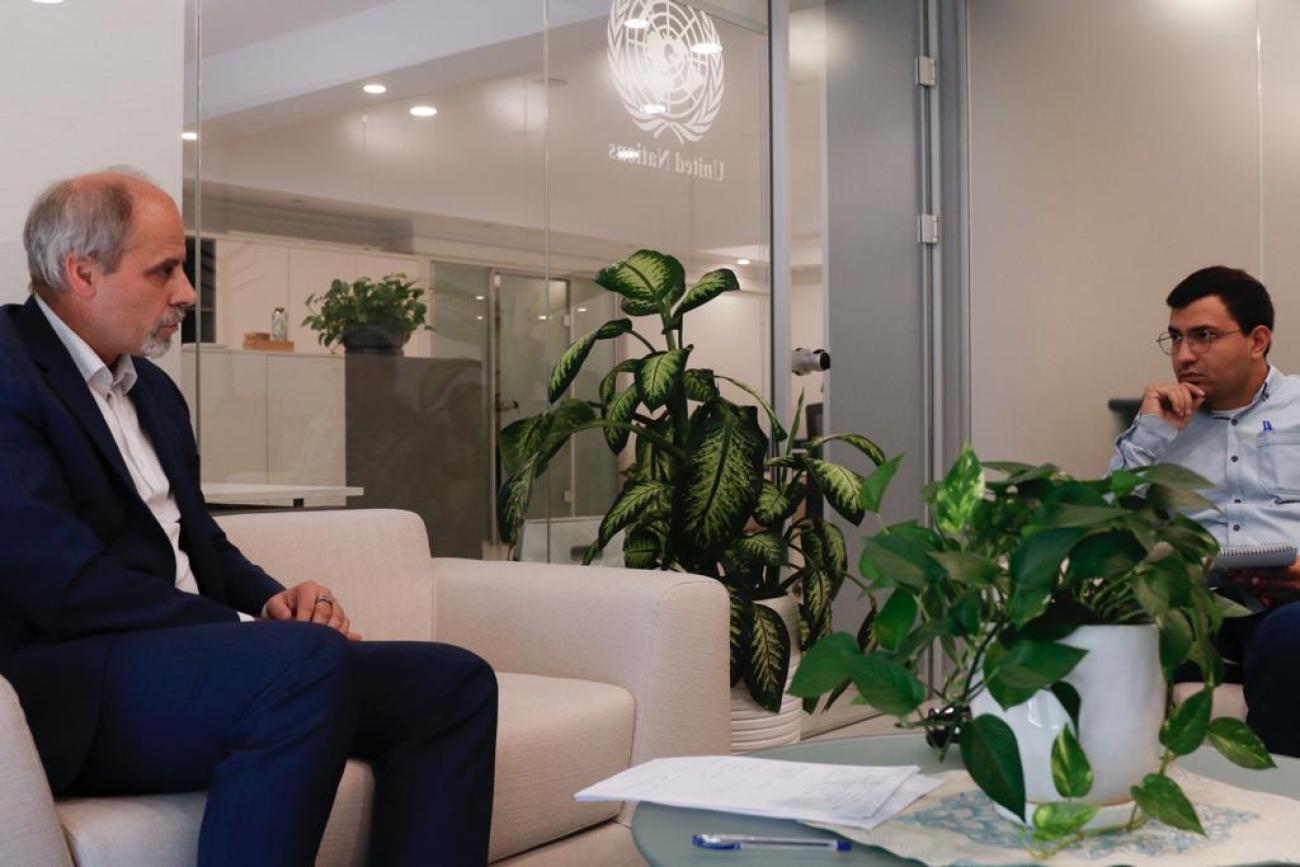UN Iran exclusive interview with Etemad

Stefan Priesner, the United Nations Resident Coordinator in the Islamic Republic of Iran, in an exclusive interview with Etemad
What is World Humanitarian Day, and why has the United Nations named it?
Every year on August 19th, we commemorate World Humanitarian Day. The occasion that has resulted in this naming is, in fact, a sad one. The disastrous bombing of the Canal Hotel in Baghdad in 2003 which killed 22 staff members of the UN, including the special representative of Secretary-General Sérgio de Mello. I remember this day very clearly. He was a man that we all looked up to and learned from. I was a young UN employee and knew some people who died on August 19th, 2003. From that day, we mark August 19th to celebrate the sacrifices of humanitarian and aid workers worldwide and their efforts and achievements in this field.
This year, the UN has picked a seemingly African proverb in its campaign to promote World Humanitarian Day. What is the meaning of this sentence? It takes a village to raise a child.
Yes, this year, we are using #ittakesavillage as a hashtag to shed light on the efforts that hundreds of thousands of humanitarian volunteers and professionals make to get humanitarian aid into the hands of millions worldwide. The real meaning of this sentence is that it usually takes the support and assistance of many supporting institutions/disciplines in the fields of education, sanitation/water health, food, health, and many other areas – together with the help of experts and specialists in various fields to put together a suitable support package for people that need help; their numbers are unfortunately on the rise. We encourage everyone to take part in this campaign with the #ittakesavillage hashtag so we can illustrate the efforts of humanitarians better than before.
At this time, which regions of the world have the most need for humanitarian aid, and which areas are the most dangerous for humanitarian workers?
If we want to start with the countries neighboring Iran, I have to say that – we all know – Afghanistan is a country that has massive amounts of humanitarian needs in various fields. Last year, 17.7 million Afghan citizens qualified to receive humanitarian aid, and approximately 17.5 million of them received those humanitarian aids. There are many other countries that very much need humanitarian assistance, such as South Sudan, Yemen, Syria, Ethiopia, and of course, Ukraine. Suppose we want to discuss statistics and the scope of humanitarian assistance. In that case, I have to say that – according to calculations in 2021 – more than 235 million people worldwide need such support. In 2022, this number will significantly increase to 274 million people. United Nations aims to support 183 million people in 63 countries. These are the range of efforts and plans for humanitarian aid at the UN, and why is this important? Because we are working at a time when there are many reasons for humanitarian crises. Natural causes such as climate change and other factors like conflict and confrontation in the world. For these reasons, every day, the number of people needing such humanitarian support increases.

What is the purpose of naming this day as such by the UN? What is the exact message you would want to convey?
Our objective is to shed light on the many daily activities that happen in this field but do not often get visibility and recognition. We do not want to advertise, but it is good to discuss the volume of activities once a year and praise those that have lost their lives in the path of humanitarianism – or those that have put their lives in danger. We want to show the importance of humanitarian assistance to the world.
You talked about the increase in the number of people who need humanitarian assistance and mentioned several reasons. What is the primary reason for this in 2022? Has the war in Ukraine played a role in this?
There are many reasons. There is no one reason, and Ukraine is not the only present crisis in the world. We face many natural disasters that have caused challenges for many countries. We face cyclones, floods, earthquakes, and many other dangers that create the grounds for an increase in the number of people that need humanitarian aid. At the same time, millions of people face immediate hunger caused by climate change and conflicts.
Recently, the UN and Türkiye played a significant role in the agreement to export Ukrainian crops between Russia and Ukraine. Are there other initiatives to solve the food crisis born from the Ukraine war?
This agreement counts as a significant achievement. There are many innovations/plans that the UN SG is following up on and requires that many different UN agencies in the humanitarian field work together to make sure they bear fruit. For this particular agreement, many agencies such as OCHA and WFP came together to ensure that this vital agreement about exporting crop products from Ukraine and getting them to the hands of tens of millions of people worldwide who need them - works/bears results.
You are the United Nations Resident Coordinator in the Islamic Republic of Iran. Allow me to ask some questions relating to Iran. One of the most important events in the past year regarding the relationship between Iran and the UN was the visit of a special rapporteur of the UN to the country after 17 years. What is your assessment of the travel of Alena Douhan?
Before discussing this, let me mention a point regarding the relationship between the UN humanitarian work and Iran. I want to say that in Iran, humanitarian activities are an important part of the efforts of the UN. Approximately more than half of our annual budget in the country is used on humanitarian work, especially the response to Afghan refugees. Naturally, you can see the increase in the volume of our support to Afghan refugees due to the events that unfolded last year in Afghanistan. Iran hosts a large number of Afghan refugees, and we praise Iran for its hosting of refugees for a protracted time.
Regarding your question about Alena Douhan, she came here by the invitation of the Government of the Islamic Republic of Iran to evaluate the negative impact of sanctions on human rights. She is an independent expert and works as the Special Rapporteur on the negative impact of unilateral coercive measures on the enjoyment of human rights. The United Nations offices in Iran (logistically) supported her trip, and her report is considered an independent report. This report shed light on the impact of sanctions.
On the subject of our role as the UN, to help the Government lessen the humanitarian impact of sanctions, we know that sanctions have had an impact on the availability of medicine in the country, and various UN agencies at different times have helped procure such medicine. One prominent example of this support is the topic of butterfly children (children with epidermolysis bullosa), where UNICEF helped procure the bandages needed by the patients.
You must know that there were allegations made after this trip, and some individuals and media reported that Ms. Douhan had received funding from governments such as Belarus and China; that these supports have impacted her report. What is your reaction to these allegations?
Our position is that she is an entirely independent expert. UN organizations usually receive funding from various countries, and in our view, the allegation that such financial support has a link to the opinions of Ms. Douhan is unfounded.
One of the aspects of UN cooperation [in Iran] was climate change. After the [signing of] the JCPOA, we witnessed some openings in this field, and projects such as Urmia Lake restoration showcase such positive cooperation. But after the withdrawal of the US from the JCPOA, these cooperation faced obstacles, and the financing of these projects did not occur. What is the reason behind this? Does the UN see itself committed to complying with the unilateral sanctions of the United States?
First, I must say that fighting climate change is one of the priorities of the United Nations. This topic is a crucial subject that is being followed up on at the level of the Secretary-General. We are happy that we have had good efforts in Iran in this field, yet a lot more needs to be done. We are progressing with a negotiated collaboration framework with the Government of Iran starting from January 2023, and climate change is a key component.
Repeating my question: what is the concrete reason for this reduction in support in the era post the fallout of the JCPOA?
Naturally, resource mobilization for the United Nations is a serious issue. We always called for more resources because the objectives were ambitious. I hope that the negotiations on the JCPOA arrive at a result, and as an outcome, we bring more resources into the country and invest/spend on various topics – especially climate change.
You said that the new cooperation will start in January 2023. What areas will these cooperation cover?
The collaboration framework is being finalized, and we will communicate this in the coming months. We hope that the documents for these collaborations are signed soon, but what I can say about the cooperation is that it is built on five pillars. One of them is socio-economic resilience to focus on poverty reduction. The next is on health – which has become more prominent since the start of the COVID-19 pandemic. The third is the environment. Climate change is an integral part of activities in this field, but – as an example – topics such as natural management/protection of natural resources and waste management are also important. The fourth is cooperation in the control of drugs, and the fifth is the topic of risk reduction and disaster management.
At the beginning of the discussion, as you were talking about Iran, you mentioned the Afghan refugees. Much has been speculated on this topic since the fall of Kabul last year. Is there a precise statistic concerning the number of Afghan asylum seekers in Iran?
Our statistics are based on the statistics by the Government of Iran. Until the end of last year [2021], 500,000 asylum seekers crossed the border and were added to the estimated 3.5 million Afghans already residing in Iran. From this number, 780,000 have Amayesh cards and are recognized as refugees. This population is one of the target objectives of UN humanitarian assistance.
In the last year, Iran has faced challenges in its membership payment to the UN. Has a solution been found so that this issue does not get repeated?
Unfortunately, this is one of the negative aspects of sanctions causing baking challenges. We are cooperating with the Iranian Government to find a solution to this problem and timely payment of membership fees.





